
The Business of Fashion
Agenda-setting intelligence, analysis and advice for the global fashion community.

Agenda-setting intelligence, analysis and advice for the global fashion community.
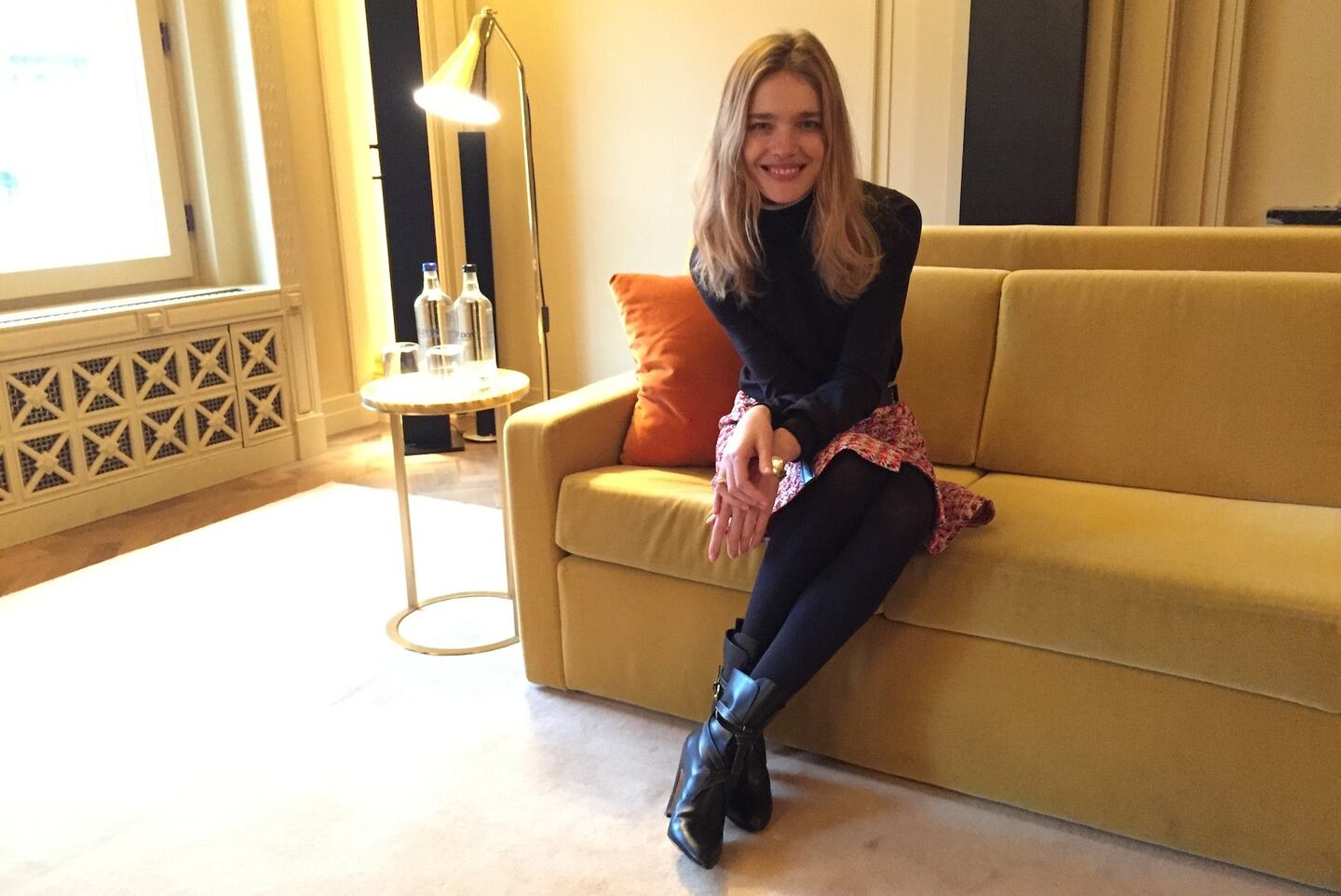
LONDON, United Kingdom — "A quarter of my childhood was in the USSR. I did get very, very important tools for life — and not the most pleasant ones — from my childhood. The ones that are not very easy to shake off: surviving and the ability to fight for something. At the time, it was really almost for life; it was for the next day, to live another day," Natalia Vodianova told BoF, sitting in an expansive hotel suite at London's Café Royal.
The luxurious surroundings could not be further from her childhood in Nizhny Novgorod, a Russian city about 400 kilometres east of Moscow. Raised by her single mother, Larissa, and her grandmother, one of two (now three) sisters, Vodianova explains: “If you come from what it may be fair to say was extreme poverty, you don’t set [the bar for] success as something so big.”
As the interview takes place, public relations people, photographers and the model's three-person team mill about respectfully. It is a true fashion mise en scène and yet, as Vodianova sits gracefully, adjusting her Louis Vuitton kilt, she radiates palpable calm. But behind Vodianova's exterior, is the same instinctual survivor that conquered the fashion industry in her teens, and maintained her relevance into her thirties. Now, however, she channels that instinct not into herself, but into serious philanthropic work.
As a girl, Vodianova was forced to drop out of school to sell oranges on the roadside in freezing conditions. It was amidst this bleak, frozen landscape that, at the behest of her boyfriend at the time, she entered a modelling academy, aged fifteen. By seventeen, she had signed with the Viva agency and moved to Paris.
ADVERTISEMENT
“When I first arrived to Paris, the biggest contrast with Nizhny Novgorod was the fact that I was able to be anonymous. I came from a tiny neighbourhood [Avtozavod] and when people put a stamp on you, that this is who you are. And poverty does put a stamp on you; that is how everyone looks at you, as that fruit seller or whatever.”
With a better life tantalisingly close, Vodianova did everything in her power to fight for it, seeking out non-Russian friends from whom she could learn French and English, and willingly taking their advice to heart. “When you are young, with that instinct of survival, you are very quick to adapt. I [was] quite different to how I am today, not at all open. I was quite defensive and I took everything as an aggression. It took a new good friend to say, ‘You are not in Russia anymore, people mean well — just smile.’ I was ready for that because there was so much happiness in this newfound life, even if it was super tough as well.”
As a new face, Vodianova had to learn to navigate a strange city in a foreign language, attending 12 to 15 castings a day. Her agency arranged for her accommodation and a stipend of $100 a week, which was expected to cover her metro pass and other living expenses. “I managed to even save money and send it back to my family, it was just amazing. It was so much to me.” Vodianova’s drive, borne from the harsh realities of her youth, soon separated her from the competition.
“It was very, very daunting walking into a casting, queuing with 50 girls. I felt so uncool and not beautiful at all, but when I walked through that door, I smiled! I was like a monkey; I was completely animated, trying to explain who I am and trying, somehow, to communicate with people even if I couldn’t [speak the language]. My agents’ response would be that ‘They all absolutely love you because you really want it.’ I guess that is what differentiated me from 50 other girls who sat there for 50 minutes, got bored, tired and showed it. I didn’t show it.”
Vodianova's stature soon reached a level few have ever matched. In her career-making years in the early 2000s, she was the face of Calvin Klein, Chanel, Yves Saint Laurent, Gucci, L'oréal, Guerlain and many more, her ice blue eyes and delicate but undeniably truculent jawline a captivating mix of angelic innocence and animal ferocity.
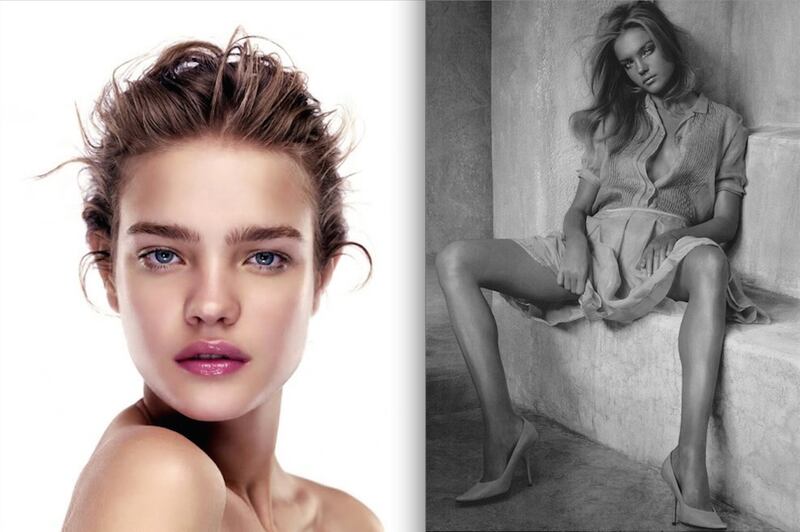
Natalia Vodianova for (L) L'Oréal and (R) Calvin Klein | Source: L'Oréal and Calvin Klein
She has walked in over 175 shows, a number even more impressive given that she "pretty much stopped" doing catwalk jobs in 2002, after signing a long-term contract with Calvin Klein, reportedly worth millions of dollars. "I was exclusive to Calvin for seven years and after that I did one show a year for friends." In the past six months alone, Vodianova has graced the covers of the American, Italian, French and Russian editions of Vogue and the style issue of Vanity Fair.
“In the beginning, when I did start getting work, if I didn’t like what I saw or how I looked I would always speak about it. I always stood out for my values. When you are extremely poor, it also teaches you to be extremely proud. It is not even that it teaches you; you are by nature extremely proud. You have been so beaten down by life, you have to stand tall. You have to find beauty and strength where there shouldn’t be any anymore. It taught me to stand by myself, so if there was something that people were pushing me to do, that I didn’t want to do, I would never do it.”
ADVERTISEMENT
Although Vodianova’s personality prompted disagreements with some industry figures — “that went to lawyers, with important people” — it was also what drove her success. “In a creative industry, where you have to make a choice, you are either someone who has no boundaries that gets moulded by all these incredible minds, or you cannot be that mould and you have to find a compromise, which is a risk.”
For Vodianova, the risk paid off. As her career quickly progressed, she rose to the highest echelons of her profession and was soon being flown, relentlessly, around the world. Despite her success, or rather because of it, Vodianova began to question the purpose of her professional life, when she gave birth to her son, Lucas, in 2001. “When you get to a place when you don’t understand why would you work ever again, why would you continue? But, still, this work is coming at you; it was a little bit strange for a year or so. But as a Russian, and coming from where I come from, you don’t reject gifts from God!”
In 2004, as Vodianova was approaching the point of “burn-out,” armed separatists, mostly Ingush and Chechen, took 1,100 people, including 777 children, hostage for three days in a school in Beslan, North Ossetia, in the North Caucasus region of Russia. In response, Russian security forces stormed the building with tanks, rockets and other heavy weapons. By the bloody and tragic conclusion of the crisis, 385 hostages were killed, including 186 children.
"I was so tormented by what happened and I so wanted to do something for the children that survived. [Beslan] was really the first time that I really went back to my childhood and really addressed this question of what was really missing, because everything was missing, but what was most important? I identified that for me it was really the few moments of carefree play that I had as child that were the most precious; most of the time, I was looking for those moments and I couldn't find them. How simple is that? And how much more needed is it there in Beslan?"
“Once you sense that feeling of being able to do something meaningful, with the new tools that you were given, plus the old tools of fighting, not for your own survival anymore or that of your family, but for something much bigger; once I felt that… it just all made sense.
Vodianova had found the purpose she believed she lacked.
Reflecting on both her childhood and her experience as a mother in New York, Vodianova became convinced that play was absolutely imperative to children’s wellbeing, and their ability to contextualise the difficulties they face in the world. She set to work to help alleviate the suffering of the children that had survived Beslan by building a ‘play park’ where they could recover.
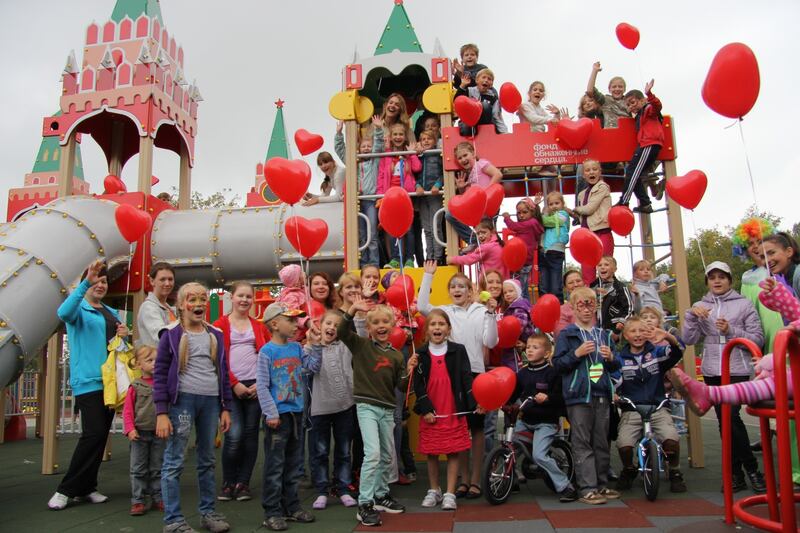
The opening of Naked Heart Foundation's 100th Play park, Nizhny Novgorod, 2013 | Source: Timon Afinsky for Supernova
ADVERTISEMENT
To date, Vodianova’s Naked Heart Foundation has raised €30 million, funding 136 play parks, numerous summer camps and an extensive network of family support centres. Each park is equipped with special zones for children with musculoskeletal disorders or specially designed to meet the needs of children with learning disabilities. In 2004, when Vodianova started her foundation, there were only 10 parks in the whole of Russia of the standard to which she now builds in partnership with local governments, who are responsible for the parks’ maintenance and upkeep. Vodianova intends to build 500.
Struck by the disparity between the loving home in which her sister Oksana, who was born with cerebral palsy and autism, was raised and the poor treatment of children with special needs across Russia, in 2010, Vodianova expanded her foundation’s mission to include Every Child Deserves a Family, which provides support to families who have children with special needs. “This is much more profound work, I guess. We are touching a very, very serious issue: children being abandoned into institutions.”
Although the foundation has recently gained “some corporate support” from BMW, Coutts, Dior, Unilever, Fiat and Net-a-Porter, the bulk of the group’s fundraising is still done through events that Vodianova herself works to create, such as her biennial Love Ball. “It has all pretty much been driven by the [fashion] industry. For the first one, everyone I approached helped. Diane Von Furstenberg lent us her studio... It is only thanks to the industry that I am able to put the auction lots together that I have been doing.”
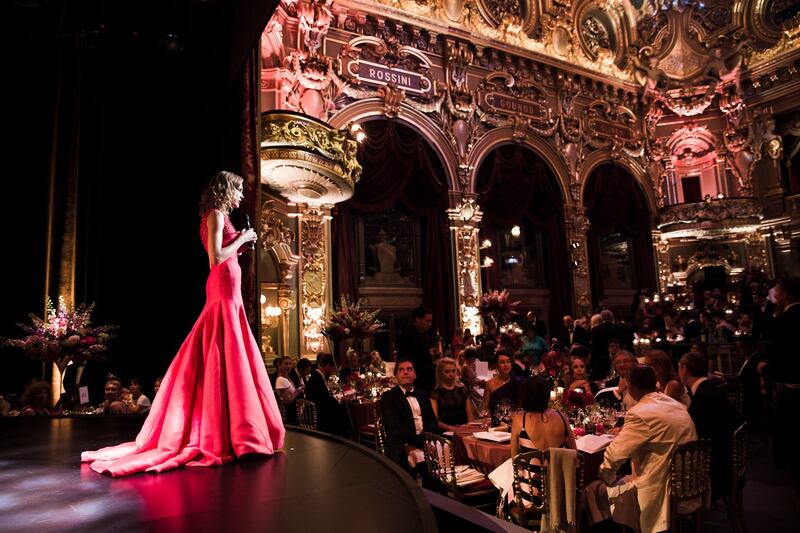
Natalia Vodianova auctioning lots at the Riviera Love Ball in 2013 | Source: The Naked Heart Foundation
The foundation's next event, The First Fabulous Fund Fair, an idea conceived of with co-host Karlie Kloss, will take place on February 24th at The Roundhouse in London. "Play is such an important part of the foundation's identity that we feel it is really right to give a different experience. As a [ticket holder] you will buy your tokens for all the different stalls, but of course the fabulous part is that they will be hosted by different celebrities: face painting by Pat McGrath, a 'Not Dog' vegetarian stand with Stella McCartney, popping balloons with [Christian] Louboutin; Karlie [Kloss] will be selling Karlie's Kookies and lemonade. All the brands will have funfair themes."
Ultimately, it is not her beauty, but the way she has channelled her instinct for survival that is most remarkable about Vodianova. It has taken her to a place in life, where she is well positioned to understand what deserving, disadvantaged children need, and to do something about it. The children of Russia, and by extension the world, are lucky to have her.
BoF and the Naked Heart Foundation are giving BoF readers the chance to win two tickets, worth £2000, to The Fabulous Fund Fair, taking place in London on February 24th. To enter, submit a photograph of yourself via Twitter or Instagram holding up a BoF x Naked Heart sign, while doing your favourite childhood playtime activity, using the hashtag #nakedheartfoundation. The winners will be announced on Monday 16th February. Here is an example from the BoF team. Good Luck!
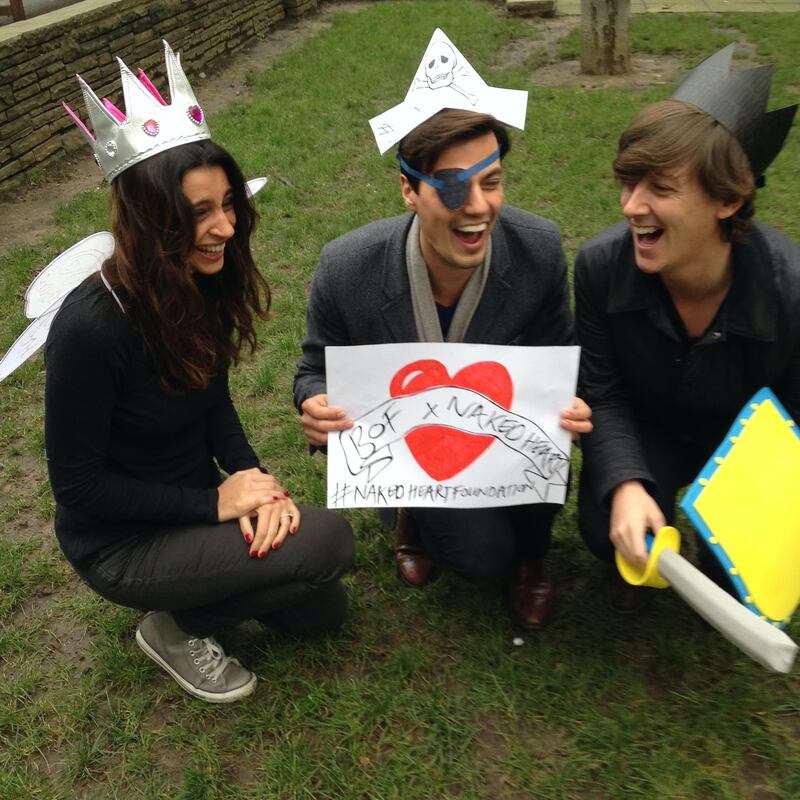
Editor's Note: This article was revised on Friday 16 January, 2015. An earlier version of this article misstated that Natalia Vodianova's Naked Heart Foundation had raised €20 million to date. This figure is incorrect. To date, Vodianova's Naked Heart Foundation has, in fact, raised €30 million.
From analysis of the global fashion and beauty industries to career and personal advice, BoF’s founder and CEO, Imran Amed, will be answering your questions on Sunday, February 18, 2024 during London Fashion Week.
The State of Fashion 2024 breaks down the 10 themes that will define the industry in the year ahead.
Imran Amed reviews the most important fashion stories of the year and shares his predictions on what this means for the industry in 2024.
After three days of inspiring talks, guests closed out BoF’s gathering for big thinkers with a black tie gala followed by an intimate performance from Rita Ora — guest starring Billy Porter.